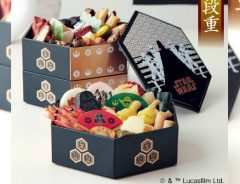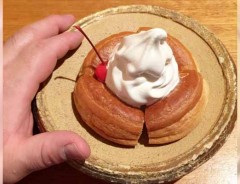
Source: PR Times
Wedding etiquette in Japan: Things you should know when attending a Japanese wedding
Related Article
-

Prepare For An Epic New Years With Star Wars Themed Traditional Osechi Boxes
-

Tokyo Prepares For A Bigger Life-Size Gundam Coming This Fall
-

Sumo Wrestler’s Massive Hands Make All His Food Look Like Miniatures
-

Agumon PC Cushion Is Here To Make Even Your Roughest Workdays Bearable
-

Pixar Just Got Even Cuter As A Colorful 9-Piece Cake Set
-

Breathtaking 8K Video Explores Beautiful Food And Scenery Of One Of Hokkaido’s Most Underrated Areas


This year, I have been invited to my Japanese friend’s wedding that unfortunately, due to the pandemic, had to be rescheduled.
I remember panicking a little bit because I had no idea what clothes are considered a proper attire as a guest and therefore, started researching more about proper etiquette at weddings in Japan.
Fortunately, I also have to prepare for my wedding in Japan, so sooner or later, I had to inform myself so I can tell my family and friends coming from Europe a few things about the customs here, what they should avoid and what they should know before coming to my wedding.
I sort of had an idea of the basic etiquette, but I had to dig in a bit more so I would get a better understanding.
It seems that Japan nowadays is not as strict as it was in the past and recently, wedding customs, too, are starting to change a little bit and everything is more laid back than it was in the past.
In the process of informing myself, I thought that asking the planner for our wedding would be the best idea.
I was already aware of some basic customs after friends and my husband’s parents discussed more regarding this topic when we last talked to each other, but I wanted to know more details, so when we went to a Wedding Fair, I got to ask a few more questions.
We also decided on the venue and met our planner, so we could thoroughly discuss this matter with her.
In Japan, everyone is explaining things so politely and take their time with sharing the details, so I found it a good learning experience and I am super grateful to all the people that guided me through all the things that should/shall not be done at a wedding in Japan.
As a host or a guest, there are a couple of things you need to be aware of and in this article, I will take my time and try to share all the information I was able to absorb with each of you, in the hope it will be useful if you, yourself, are invited to a Japanese wedding in the future.
First of all, the customs when going to a Japanese ceremony are more or less the same regardless of the type of wedding (be it Christian, Buddhist, or Shinto) the hosts are going for.
Nowadays, thanks to technology, many people tell their friends, relatives in advance about the wedding date via social media platforms.
This is one thing I did as well, so they’d know in advance and have enough time to answer me or plan their schedule ahead of time.
After the informal invitation when you usually also ask their addresses, the hosts will send an official invitation along with the attendance card to require the confirmation.
The details of the place, reception, and so on are written on the invitations and when you send the attendance card, you also specify if you have any food preferences/allergies and so on.
What is important to know is that you need to send in a clear answer so the hosts will know if you will be attending or not (within the time limit specified on the card).
In case you won’t be able to attend the wedding, it is manners to send in a wedding gift or goshugi (gift money). From what I’ve heard, goshugi is more frequent than gifts.
In case you are going for a gift, in Japan, they have these catalogues for weddings that you buy and the newlyweds can choose from either various activities (such as pottery, latte art, camping, dinner, etc.) or food/ tableware catalogues.
Some people, if they are close friends or relatives, buy these catalogues when they hear you got married as a congratulatory gift whether you had the wedding already or not.
In our case, we got a catalogue with activities and chose pottery(you can read more about it here)from one of my husband’s friends because we chose to register our marriage before the ceremony.
Now, I will take everything in chronological order and thoroughly explain what the guests should be aware of when going to a Japanese wedding.
Gift money (Goshugi)
In my country, people do give money as a gift, however, we don’t have a certain amount and the guests just give out the amount they want to. Of course, the costs of a wedding in my country and Japan are quite different.
A wedding in Japan costs around 4.000.000 yen (approximately 33,300 euro), so friends/colleagues usually pay around 30,000 yen (250 euro).
Family, relatives, or superiors pay an amount between 50,000 yen (416 euro) and 100,000 yen (833 euro) and usually, a close friend, someone from your family is in charge of collecting the money from all of the guests.
Usually, the gift money is put in a paper bag that you can buy from libraries, supermarkets, convenience stores, etc.
The paper bag is called “Goshugi bukuro”. You need to make sure you withdraw the money before the wedding and then, put it in the paper bag.
The money is supposed to be new banknotes, have no creases, and look nice before putting it in. Don’t forget to write your name on the goshugi bukuro before and bring it with you on the wedding day.
Goshugi is pretty much mandatory and although 30,000 yen is around what people usually give, you can give more or less, depending on the area/budget.
However, it is important to know that you need to avoid the numbers "2" and "4" (also their multiples) as it is considered bad luck and it is said that those numbers relate to “being split”.
Needless to say that in Japan, you don’t come with family/lover along if you are invited and in case you want to ask someone to come with you, such as husband/wife/kids/girlfriend/boyfriend, you’ll have to ask the hosts if they are okay with it.
If you decide to bring someone, be aware that they would also need to pay the goshugi.
Expect a gift in return
Whenever you go to a wedding, you usually receive a hikidemono, a gift in return.
Inside a bag left under the chair, you’ll find some small gifts such as glasses, towels, tableware, sometimes with hikigashi(sweets) that you will take home with you as a present from the hosts.
I mentioned above the gift catalogue and recently, giving those instead has been more popular because that way, the guests can pick by themselves things they want and need instead of receiving something they won’t be using in the future.
What should you wear?
First of all, women should avoid wearing white clothes or something too revealing.
Showing your shoulders, your bust, or too much of your legs is not appropriate and in case your dress shows your shoulders a little, it is recommended to use a shawl or something else to cover it.
From what I’ve noticed, many girls wear dresses that are not shorter than above their knees, in colorful or pastel colors.
Men should avoid black ties (women should also avoid black dresses) and go for white, pink, vibrant colors. Other than that, men usually come dressed up in suits.
I have seen a few people also wearing kimono and sometimes the family members tend to dress up in kimono especially if the wedding is a traditional one.
I plan on giving my mom a unique experience and we chose to also rent kimono for our mothers. From what I've seen in the catalogue our planner showed us, most were black kimono. As for fathers/men, there is no hakama/traditional wear so what they rent or choose is usually a western attire and just wear suits.
Nijikai/二次会- Afterparty
After the wedding ceremony, some newlyweds decide on having an afterparty.
Most of the time, people let them know ahead of time if they want to participate or not so that the hosts can extend the hours of the venue, they had their ceremony at or rent a different space just for the afterparty.
Sometimes, at the wedding ceremony /Hirouen(披露宴), only family and the closest friends are invited, that is if the couple wants something smaller or just wants to have a less expensive wedding.
For nijikai, the hosts usually invite people that came to the Hirouen, friends that were not invited at the ceremony, along with colleagues and acquaintances so they can have a more relaxed time together, party, and drink in a more laid-back atmosphere.
If the couple decides on having an afterparty and you are invited, you should still prepare gift money, but it is less than the amount for the wedding, depending on where they choose to do it. Mostly, people pay around 10,000 yen (83 euro).
These four points are the most important things you need to be aware of when participating at a Japanese wedding and I hope it’s going to be useful if you get invited someday.
Even if you don’t, I hope you found it interesting and learned a bit more about customs in Japan.